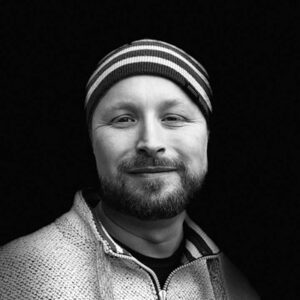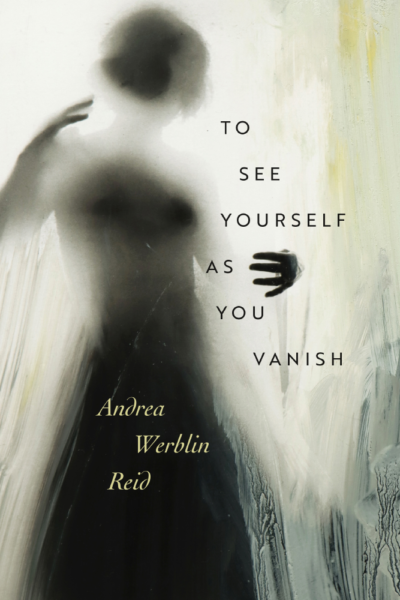

In the last three years of her life, Andrea Werblin Reid wrote 150 poems on living with ovarian cancer and end of life.
Before she died, she asked a group of friends—including Sarah K. Sawyer, a co-author of this story—to do what they could to get the book into the world.
Werblin Reid died of ovarian cancer in 2022. Her third collection of poetry, “To See Yourself As You Vanish” is available for preorder wherever you buy books.
She is remembered by her husband, Angus (Gus) Reid, as told to Sawyer.
I always liked poetry, but I was never a poet. I had to marry into that.
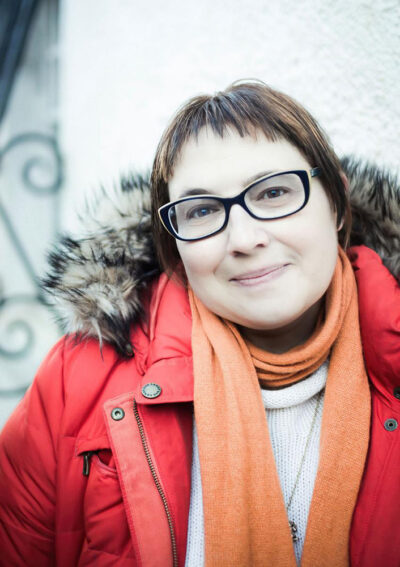

The first time I saw Andi, she was reading a poem she’d written for the wedding of some mutual friends. After the ceremony, I clumsily flirted with her, and she warily flirted back.
A few years later, I made the move from Edinburgh to Boston to marry her and got myself hired at a radiotherapy company. I was excited to be working with really interesting technology on something worth doing.
I always describe what we do as making particle accelerators for cancer treatment, but it’s not really true. We do make them, but most of my time is spent on all the things around them: treatment planning, scheduling, dosimetry recording, plan validation, patient verification, 2D and 3D registration, patient positioning, respiratory gating, energy selection, beam collimation, motion planning, collision prevention, and always, always, patient throughput. Ion therapy is rare, in high demand, and treatment sites keep long hours.
I had recurring nightmares in the run-up to our first patient treatment: It was me and one of the other engineers at the “flight deck” test stand.
We’d be working on software, getting something tested and debugged, and a patient would appear on the couch, ready to be treated, and we’d say, “No we’re still testing! We can’t treat with this!” I’d wake up just as the beam was being turned on.
We’d been married seven years when Andi was called into her ob-gyn’s office.
RE-TREATING
Andrea Werblin Reid
in your mind it feels like this: you walk into a hospital and
a bridge explodes. a face flinches from a hand. a man walks out of a bottle.
somewhere else birds call out in a sound so grave and divine, it divides sunset, which was otherwise busy blazing across the wide neckline of the sky.


Source for all photos: Sarah K. Sawyer
Words were Andi’s area, and the language we heard from medical providers in early days often used war as its metaphor.
I think a lot of people do think about fighting cancer as a battle, and though that’s a perfectly fine metaphor for some people, it was very much not for Andi. She certainly never felt like she was “fighting.” If anything, she was the battlefield, not one of the sides. Her feeling was cancer is something your body is doing, it’s not an external force. And you can’t fight your own body. You can treat it and you can try to live with it, especially something like refractory ovarian cancer, which isn’t going away.
Maths and probability are more my area, and the numbers I ran early on were often a way to make sense of things. For example, given that a woman is Ashkenazi, and has been diagnosed with ovarian cancer, what is the probability that she is BRCA-negative? This pointless little Bayesian puzzle wound itself into my head during a meeting with Andi’s hematologist when the genetic testing results showed that was her category. Ashkenazi Jews are ten times more likely to carry the BRCA mutation as the general population, and ovarian cancer has more management options available for carriers. It was a bitter disappointment to find that she wasn’t one.
I was flatly in denial that she was dying anytime soon. She knew she was and didn’t try to disabuse me of it. OC is not curable beyond front line treatment, but there are options to manage it that can work for a decent amount of time. It can feel like you’re just trying to find that one combination of things that will stabilize things, and you’re inevitably going to find it, and we didn’t. There really wasn’t one.
CLINICAL TRIAL
Andrea Werblin Reid
In exchange for a public chance at a longer private life, you give them,
not your body, but your body’s one error in calculation. the swerve,
detour, blunder unique to your system. you give them the soft scribble
of your consent. in exchange for a future where you might run
among penguins, or consider the altitude of a lark, his small brown body
racing vertically into the sky, you agree to be watched like a hawk.
Asked hundreds of times if you’re ok, if there’s anything they can get you.
longer life most people think. glass of water most people say,
since there is often some small thing lodged in the throat.
you remember that larks sing when they fly, unlike any other bird.
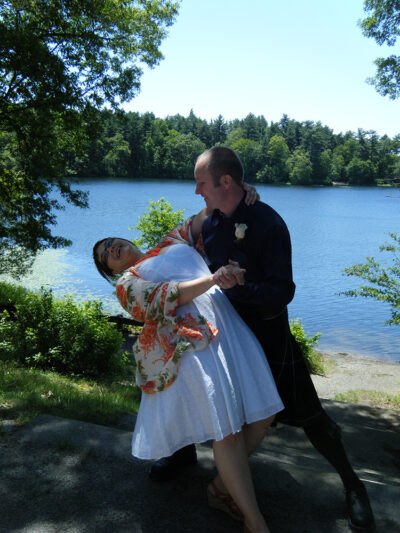

Cancer treatment is stochastic. You’re moving the needle a little one way or the other but the standard of care is probably about where you’re going to land. Still, if there’s anything you can do just to move that needle even a fraction of a percent in the favor of the person you love, your person, then you have to, and there isn’t really a limit on how much time you can spend on that and how much you should grind yourself down trying to see if there is the slightest thing you could do differently.
I spent my days close-reading papers, carefully ignoring the implications of phrases like ”progression free survival”, running the odds over and over. Gambling with my wife’s life.
We picked a trial, in the end, mostly based on local contingencies rather than any of those numbers and, as a show of faith that feels weird to me now, I bought some stock in the biotech company. Rien ne va plus. The price spiked on my birthday in 2021 as her tumour burden shrank by a third, she came home from a biopsy unsampled having been told there wasn’t enough to extract, and we felt some real hope. It didn’t last. A few months later, the immune system effects had become too overwhelming and dangerous for Andi to remain in the trial. When I checked this morning the company had lost 95% of their value. Good try. Worth a shot. Did I choose wrong?
B E T R AY
Andrea Werblin Reid
whoever insists staying positive is—
let me stop you there, let me tell you about
this ugly algorithm that brought us all together.
rogue cells, a cowboy cell, that one cell
that fucked up everything—
it’s a useless mythology: neat but absurd.
don’t think about cured, she said. think about healed,
because cured is an island and healed is like—what?
a burning sunflower?
hope is the most ridiculous option on the table.
it’s a silent creeper, sweet-veined rosebud offering up
pinpricks of light. i wouldn’t let that in if i were you.
there’s nothing innocent about it.
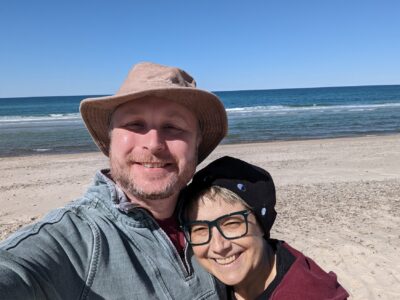

For most of her illness, Andi wasn’t writing. When it became clearer her time was limited, it was like a dam had burst and she was able to write again and a lot of it came in a flood. She very early on started reading her work at support groups, the Virginia Thurston Healing Garden and later at the Turning the Tide ovarian cancer retreat. At those readings she got some tremendous feedback from people: that she was expressing things that they felt and weren’t able to express for one reason or another; they couldn’t find the words for this new reality or feel they could say them when they did find them.
Carl Sagan, in his novel “Contact,” gives us a main character who knows the inarticulacy that comes from facing an overwhelming new reality. In the 1997 film adaptation she says, “No words. No words to describe it. Poetry. They should have sent a poet.”
For a long time, Andi resentfully called the stack of work that became this collection her “stupid cancer poems,” but I was already thinking of it as her grimoire. A book of forbidden knowledge.
Andi’s intended audience was cancer patients and, to some extent, their loved ones, but I think she had things to say that are useful and even important for people working in oncology. The angry, hurting Andi of these poems is not one that her doctors and nurses would necessarily recognize. She was friendly, funny, and even goofy a lot of the time. That was her, and it was also a front to keep her feelings private. I’ve seen her throw up and then immediately smile and chat up a health care provider. Anger may be kept hidden, even in people who are very angry.
When You’re Done
Andrea Werblin Reid
when you’re done being angry, we don’t want to hear about it.
when you’re done being tired, sarcastic, forgiving, and bitter—
done with rabbit holes, chakras, and mantras of cruelty—
when you’re done with all the dang stories of your life unspooling like polite paper wings. when you get near to collapsing, finish with catapulting wrongs and the disorder of street maps.
when you finally release the cluster of fossils you hold fast to, place your brain into orbit like a twinkling satellite, then you will be welcomed. tugged on constantly by the gravity of earth, freed to take advantage of its rotation.


The week I returned to work, two weeks after the cancer had finally starved Andi, we were working on time-saving improvements to the patient weighing system. Our patient positioning system is an industrial robot arm that can position to sub-mm accuracy over 270 degrees of arc and, because it’s in the beam line, is made of aluminium not steel. It bends under load. We compensate for that bending by offsetting the treatment position by a vector calculated from measuring the deflection at a known position. This is known colloquially as patient weighing, and it takes about a minute and a half per patient on every treatment day.
A minute and a half per patient at a maximum capacity site treating forty patients a day is an hour of lost time each day, enough time for three or four more patients. So, do we have to measure every patient every day? What’s the minimum safe number of times we can weigh the patient? How much weight can a patient lose during a month-long course of treatment? The question came up in three or four meetings that week and, though my ability to compartmentalise had grown strong over the years since her diagnosis, bringing the answer to mind without also recalling her emaciated frame was impossible.
How does one ever accurately measure a loss?
Andrea Werblin Reid’s third collection of poetry, “To See Yourself As You Vanish” is available for preorder wherever you buy books. Werblin Reid died of ovarian cancer in 2022. “To See Yourself As You Vanish” is being represented by Rob McQuilken and will be published by Wesleyan Press Sept. 9.
You can find out more at the book’s website or on Instagram at @andrea_werblin_reid_poetry. You can use the discount code QWR35 for 35% off of “To See Yourself As You Vanish.”


